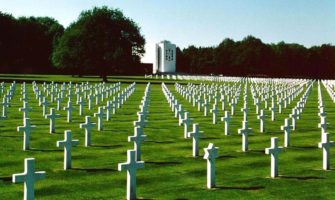
We Will Not Break Faith With Those Who Died
The use of cross-shaped memorials has been a long standing tradition in honoring the dead. In 1915 Major John McCrae wrote the famous poem, “In Flanders Fields” and the cross reference is no mistake. Learn more at FirstLiberty.org/Briefing.
In May of 1915, Major John McCrae buried his friend. It is believed that after the burial he penned the now famous poem, “In Flanders Fields.” This is what he wrote:
In Flanders fields the poppies blow
Between the crosses, row on row,
That mark our place; and in the sky
The larks, still bravely singing, fly
Scarce heard amid the guns below.
We are the Dead. Short days ago
We lived, felt dawn, saw sunset glow,
Loved and were loved, and now we lie In Flanders fields.
Take up our quarrel with the foe:
To you from failing hands we throw
The torch; be yours to hold it high.
If ye break faith with us who die
We shall not sleep, though poppies grow
In Flanders fields.
The reference to crosses was no accident. These were the markers used for temporary gravestones across Europe.
When the graves were made permanent, the world community rejected efforts to convert the temporary, cross-shaped gravestones into rounded tombstones.
That is why today, across America, many veterans memorials are cross-shaped. And, that is why we defend them.
Today, “the foe” of McCrae’s poem are those wishing to purge the religious from public view, including veterans memorials bearing religious imagery. But, we will not break faith, with those who died.
To learn how First Liberty is protecting religious liberty for all Americans, visit FirstLiberty.org.
(This podcast is by First Liberty Briefing. Discovered by Christian Podcast Central and our community — copyright is owned by the publisher, not Christian Podcast Central, and audio is streamed directly from their servers.)